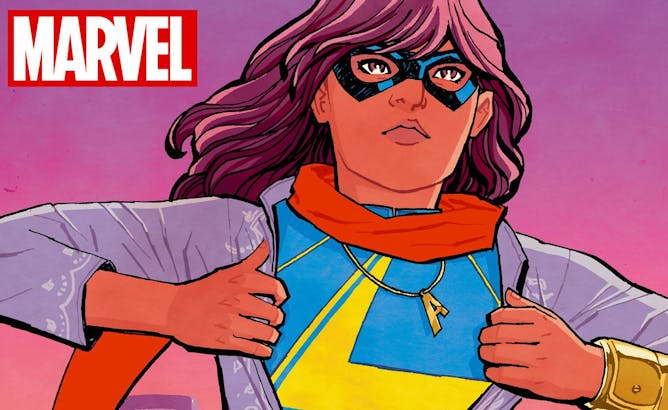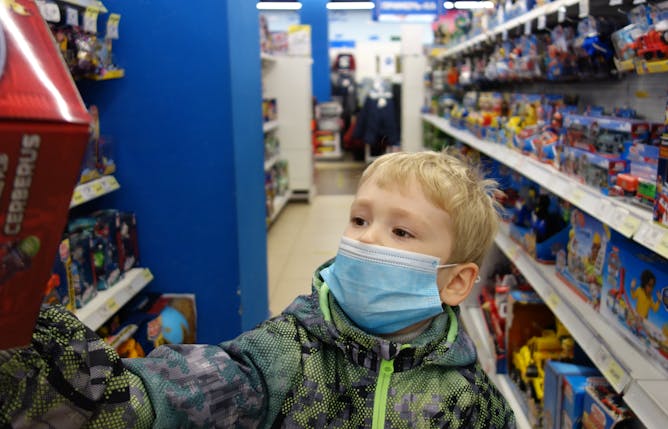|
What are your superpowers right now? Are you working on only a few hours of sleep? Digging for hope, perseverance and death-defying feats in the face of the world’s many injustices and COVID-19?
Look no further: Today in The Conversation Canada, Safiyya Hosein of Ryerson University describes a source of excitement for comics fans: the coming of Marvel Studios’s first on-screen Muslim superhero, Ms. Marvel, also known as Kamala Khan. A Canadian teen actress, Iman Vellani, has been cast in the role for the show that is slated to premier on Disney+ in late 2021 or early 2022.
Hosein brings her expertise researching Muslim superheroes in American comics to illuminate not only fans’ love for Ms. Marvel — snapper of selfies with her pal Wolverine — but tensions in different ways the superhero has been rendered. She examines Ms. Marvel also in the context of “a resurgence of Muslim superheroes in American comics after 9/11.”
Also today:
Regards,
|

Some Ms. Marvel comic storylines have revealed her as a well-rounded character while others have advanced Islamophobic themes.
(Marvel)
Safiyya Hosein, Ryerson University
The Urdu-speaking powerhouse, Ms. Marvel, has destabilized stereotypes of Muslims and reinforced ideas about American exceptionalism.
|

The decision by World Rugby to ban trans players from participating in women’s events is another setback for transgender athletes.
THE CANADIAN PRESS/Jonathan Hayward
Michele K. Donnelly, Brock University; Bruce Kidd, University of Toronto
If "fairness" is why trans players have been banned by World Rugby, then sport bodies need to realize many athletes have an unfair advantage because of issues like class and cultural backgrounds.
|

Self-driving cars are programmed to identify and avoid risk, but in the case of an accident, who is legally responsible?
(Shutterstock)
Francesco Biondi, University of Windsor
As self-driving cars increase in popularity, the question of legal liability remains. The driver, automobile manufacturer and software designers all have a role to play.
|

Now might be a perfect time to involve children in discussions about saving money and encourage them to practice making their own saving decisions.
(Shutterstock)
Tessa Mazachowsky, Brock University; Caitlin Mahy, Brock University
The act of choosing to save or spend money often involves considering a future point in time. Greater focus on saving and budgeting can help children better develop saving skills.
|

La mairesse de Montréal, Valérie Plante, pose avec son nouveau livre, Simone Simoneau, à Montréal, le 20 novembre. Elle y raconte son entrée en politique et le sexisme qu'elle a rencontré en cours de route.
La Presse Canadienne/Paul Chiasson
Mireille Lalancette, Université du Québec à Trois-Rivières (UQTR); Anne-Marie Pilote, Université du Québec à Montréal (UQAM)
Grâce à des images graphiques fortes, « Simone Simoneau » porte un regard lucide sur la politique. La bande dessinée est une manière originale d’expliquer les dessous des campagnes politiques.
|
COVID-19
|
-
Lara Herrero, Griffith University; Eugene Madzokere, Griffith University
It's not only shedding and reinfection which are different — there are actually two types of viral shedding.
|
|
Education
|
-
Natasha Heller, University of Virginia
Taiwan has made significant efforts in protecting its environment. A scholar writes about how the country educates its children on protecting the environment through Buddhist stories.
|
|
Science + Technology
|
-
Steven Freeland, Western Sydney University; David Kuan-Wei Chen, McGill University; Ram S. Jakhu, McGill University
A change of government in the USA means less risk of 'space war' and more hope for peaceful cooperation.
|
|